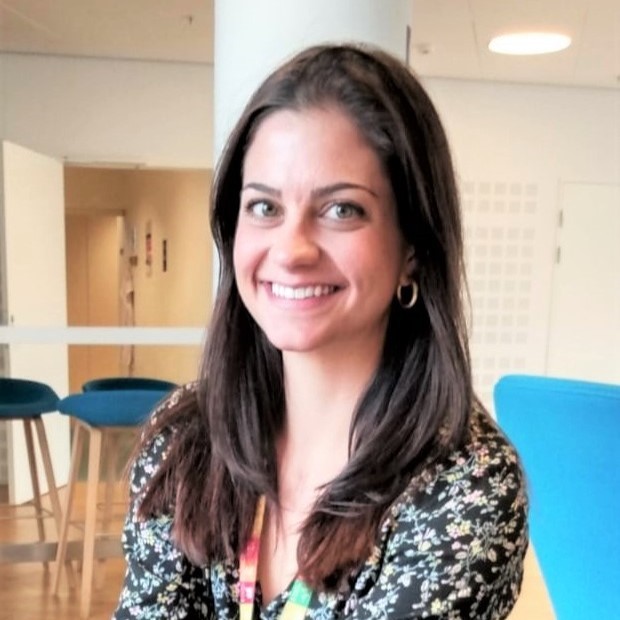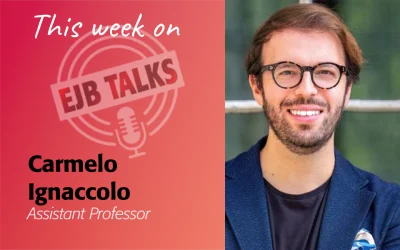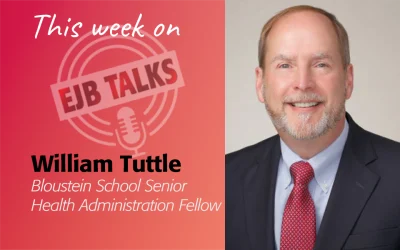It’s Bloustein’s 30th anniversary, so this season of EJBTalks Stuart will be welcoming our amazing alums! Our first alumna of the season is Stefania Davia, who received her bachelor’s in public health from the Bloustein School. Stuart talks with Stefania about the exciting career path she took around the world from her time as a student in Nicaragua, to her position with the World Food Program HIV and nutrition unit in Italy, to three years working in Lesotho in Africa working on population-based HIV impact assessment. Stefania discusses how the COVID pandemic and its impacts and challenges impacted her current position with WHO’s regional office in Europe and what lessons can be learned to improve the use of data in crafting national and global responses to future public health challenges. Finally, Stefania describes the positive impacts the education and the atmosphere at Rutgers had on her career from its beginning to today. Tune in for all this and more!
Stuart Shapiro
Welcome to EJBTalks. I’m Stuart Shapiro, the Interim Dean of the Bloustein School, and the purpose of this podcast is to highlight the work my colleagues, and this season, our alumni in the fields of policy, planning, and health, are doing.
This 30th anniversary year for Bloustein we are focusing on our alums, and the contributions they’re making around the world. Today, we welcome Stefania Davia from the World Health Organization to the podcast. Stefania got her bachelor’s degree in public health here at Bloustein. Welcome, Stefania.
Stefania Davia
Thank you so much. I’m a big podcast listener, but I’ve never been on a podcast before so this is very exciting for me.
Stuart Shapiro
I think eventually everyone will be on a podcast. So here’s your chance.
So I think you are probably the guest that is coming to us from the greatest distance that we have had. So tell us a little bit about your journey from Rutgers and New Brunswick to… Copenhagen I think it is, and the World Health Organization.
Stefania Davia
Yeah, sure. So I finished Rutgers in 2011, which is crazy to me that that’s actually already more than 11 years ago. After graduation, I spent that summer doing some volunteer work in Nicaragua for a nonprofit. And then I moved down to Washington, DC, to start my MPH at George Washington University. And during my master’s, I had a lot of really random jobs, everything from a tech on an oncology floor to a hospital, I was a research associate on an HIV clinical trial. And I was also doing mobile HIV testing out of a van at one point. It’s probably also why it took me three years to finish my master’s.
But part of my master’s involved a practicum. And so at the time, GW had a scholarship program to send students abroad for this kind of work. And I was placed with the World Food Programs, HIV and nutrition unit in Rome, Italy. So after the practicum was done, I went back to DC and back to my job, on the clinical trial that was sort of plotting my eventual escape from DC, I wanted to try something new. And in the autumn of 2014, I applied for what is now the Public Health Institute’s CDC Global Health fellowship. And I ended up in Lesotho, which is a small country inside of South Africa, most people can’t even find it on a map.
But I lived there for three years, it was a really, really interesting job I was doing. I was working on a population-based HIV impact assessment. And I was doing everything from protocol questionnaire development, training data collectors, conducting field visits, data analysis. Yeah, a little bit of everything. After that, I spent so many years in research, so I thought doing Ph.D. would be a great idea. And I ended up in Gothenburg, Sweden doing a Ph.D. But I sort of quickly figured out independent research wasn’t really for me. So after a few months, I started applying for new jobs. One of those jobs was with the WHOs regional office for Europe, in Copenhagen, and that was February 2019. And here we are ever since.
Stuart Shapiro
That’s, that’s fantastic. And it’s a great…
Stefania Davia
It’s like the SparkNotes version.((laughing))
Stuart Shapiro
((Laughing)) It’s a great illustration of sort of the variety of things someone can do after they get a public health bachelor’s degree and then an MPH and so
Stefania Davia
Yeah absolutely.
Stuart Shapiro
.. so a lot of different opportunities that you’ve explored. So let’s talk about what you’re doing right now. Tell us about the kind of work you do for WHO.
Stefania Davia
Yeah, sure. So my exact title is just Technical Officer for Data Monitoring, Analysis and Forecasting, which is a really broad title, which is great because I actually do a little bit of everything in the data science analytics fields. I do kind of everything from data collection and data validation. And this is from, there’s actually 53 countries in the WHO European region. It’s not just the EU, it’s everywhere from Iceland to Kazakhstan, from Norway to Malta. So it covers a really big geographic area, which makes the work really interesting. So I do a lot of mortality and demography, statistics, and data analysis.
And this is for everything from putting together country profiles and doing stocktakes which are kind of like a snapshot of a health situation and trends in countries that our regional director and the WHO country directors use to make plans for what WHO will do in the future. I also do a little bit of health information systems assessments. This is when we go actually into a country, we have meetings with different stakeholders in the health information system, and we look at some of the strengths and weaknesses, opportunities and threats that exist, and make some recommendations on how to improve the situation by having partnerships with WHO and other international organizations. And I also just work with a lot of different country governments and data quality and reporting. And it’s a really nice mix of like technical and diplomacy. And so that’s been a really nice experience for me to have both.
Stuart Shapiro
That’s great. That’s a lot of exciting work. So I was reading in the Times a couple of weeks ago, that one of the failures with COVID-19, in this country in the United States was a data failure. The fact that, you know, we didn’t know who had what, when, what commonalities there were between people, and just that our data systems failed. It wasn’t obviously the only problem, there were a lot of other problems as well. And I’m wondering how your experience whether Europe has had similar problems, or, you know, whether there’s an effort right now to sort of move beyond and make sure, heaven forbid, the next time something like this happens, we have data systems ready to move here to help us.
Stefania Davia
Yeah, so actually, after almost two and a half years within the COVID pandemic, my job has only just started to return to what it was before 2020. This summer, actually. In terms of Europe, we’ve had a lot of the same challenges. And of course, working across different countries, the health systems are so different, the way they classify diseases is so different, the way they treat pandemics are completely different, and the way they respond to international agreements is completely different. So it makes working in an emergency situation really, really challenging.
Now, WHO Europe is moving towards what they call a dual track method of delivery now, which means that on one hand, they’re ensuring that countries are prepared and that they’re ready to detect and respond to emergencies. But also, at the same time ensuring that routine disease prevention and control programs are also still in place. Because a lot of those were actually not really done and neglected even a little bit over the last few years. And we’re already starting to see some of those diseases and conditions that were doing really well and not an issue before COVID start to resurge now. Yeah, so during the first year of COVID, everything sort of all of our normal things stopped and all the effort was on COVID. And now at least, at least now that we’re not in like a crisis mode anymore, we have time to ensure that the rest of the health system is sort of operating at an optimal level as well.
Stuart Shapiro
Great. So from a data perspective, what should we be doing that we’re not doing? What needs to get better?
Stefania Davia
I think the things that need to get better are that there needs to be common agreement on the way certain terms and certain things are hard to find. And I think people need to be willing to share data a lot more freely, than they are. One thing we’ve seen a lot during these health information systems assessments is that in a country, for example, maybe the Ministry of Health or the Department of Health and Human Services in the US, maybe they will have some information, and they will want to share it. But for example, the Public Health Institute or CDC won’t want to share the information they have back. And that’s been a big problem in Europe to get a lot of the different countries’ own organizations within the countries to share and cooperate together.
And if countries within themselves can’t cooperate, how on earth can they cooperate at an international level to bring data and good information together to build evidence-informed policies, it’s impossible if their own countries can’t first come to a consensus themselves. So I think that consensus and cooperation are really key. And you really can’t accomplish anything in any field until you have that. And I think it’s also very overlooked. I think with data people tend to think you need to start with having everything electronic and everything works really well. But no, it’s actually like people come first, always and communication and cooperation is key.
Stuart Shapiro
Yeah, you can have the best data in the world, and if you don’t use it…
Stefania Davia
Yeah exactly.
Stuart Shapiro
If people don’t talk the right way or talk to each other.
Stefania Davia
Exactly.
Stuart Shapiro
And then it doesn’t matter.
Stefania Davia
Exactly.
Stuart Shapiro
So would you? Would you put that as sort of the big lesson of the past couple of years? Or what other lessons do you think we’ve learned and WHO has learned?
Stefania Davia
Exactly that. And I think, along with that, I think that even if countries have different health systems and different levels of development, a lot of times the struggles when it comes to data, are really quite the same. There are not enough people to do the work. And that a lot of times, even if data are collected, they’re not used in the right way at the right time, in a way that positively impacts the policies that are being made. And I think there’s a lot of disconnect between the data that’s generated and the policies that are created. And I think one thing that WHO and other bilateral and multilateral organizations do is that… do well, rather, is that they provide a forum for countries to come together and discuss these kinds of things. And they really provide a platform to address issues in a non-partisan way that I think can be really, really a challenging thing to do.
Stuart Shapiro
Great. So let’s look back a little bit on your Rutgers education because we have to do a little bit of promotion here.
Stefania Davia
Of course!
Stuart Shapiro
What do you still draw on from your, from your bachelor’s degree studies? What lessons do you remember that still resonate today?
Stefania Davia
A lot of things. I think probably the two biggest things Rutgers has taught me among a lot of things were; one, how to work collaboratively with people from different backgrounds and sort of how to use that to your advantage. And the second thing is really the importance of being involved in activities sort of outside the classroom.
I grew up in a kind of relatively homogeneous community in central New Jersey and my public health classes at Bloustein were really some of the first times that I was exposed to people from all different backgrounds. Of course, I’d experienced diversity before but not in the quantity that I feel like I got at Rutgers. And I feel when you’re working in a field, like public health, or public policy, or urban planning, you really are exposed to everything. And so having that in your undergraduate education is just like, it’s invaluable.
And I have been to a lot of other universities, and there’s really no place like Rutgers for that. I think. There are also so many ways to get involved in the community through Rutgers, doing internships, or at Bloustein, when I was there, we had to do a practicum in the fourth year of public health school, and I just had some really great experience that I feel set me up really well for, for real life.
Stuart Shapiro
Great. It is amazing when one stands on the podium at graduation, and looks out at the graduating students. The amazing diversity; racial diversity, background diversity, the number of first-generation students that we have here, and that that’s true, not just of us, but really throughout Rutgers. And so it’s really good to hear you say how valuable that was. What would you say that… let’s conclude by asking you, what would you say to students thinking about majoring in public health getting an MPH, or considering careers in the field? What advice would you give what encouragement would you give?
Stefania Davia
I would definitely say, and I hope it’s okay to say this, then obviously, what you do in the classroom and your studies and your grades, of course, matter. But personally, I think what really served me the best is also getting involved outside the classroom and getting some other experiences, practical experiences, that really got my feet wet a bit and gave me a taste for what was to come in a professional setting. You know, I got involved with the health outreach promotion and education group at Rutgers. And I did a lot of really cool stuff through them. And I feel like the real kind of magic happens when you can take what you learn in the classroom and utilize it in a real-world setting. And I just don’t think it’s ever too early to start looking for those experiences.
And it doesn’t have to be anything outrageous. There are ways to get involved in your local community that can provide this and I think Rutgers being in New Jersey and being in close proximity to so many big cities and big industries and big research centers, it’s just the perfect environment to cultivate a good mix of professional development with what you’re learning in the classroom. And so I would definitely say just get involved in as many exciting and cool things and nothing is ever too small to put your attention towards.
Stuart Shapiro
That’s great advice. And of course, it is okay to say that.((laughing))
Stefania Davia
Yeah. ((laughing))
Stuart Shapiro
We definitely want our students to concentrate on their classes and all the wisdom our wonderful professors have to offer, but we also want them to get the most out of their four years as an undergraduate and it’s true in the graduate programs as well and you do that by having a much broader scope than just in the classroom. And we certainly recognize that.
Well, thank you. It’s been wonderful talking to you. Thank you for coming to us from across the ocean.
Stefania Davia
Thank you so much for having me. It was so nice.
Stuart Shapiro
Excellent. Also a big thank you to our production team, Amy Cobb and Karyn Olsen and we will see you next week with another talk from another alumnus from the Bloustein School. Until then, stay safe




